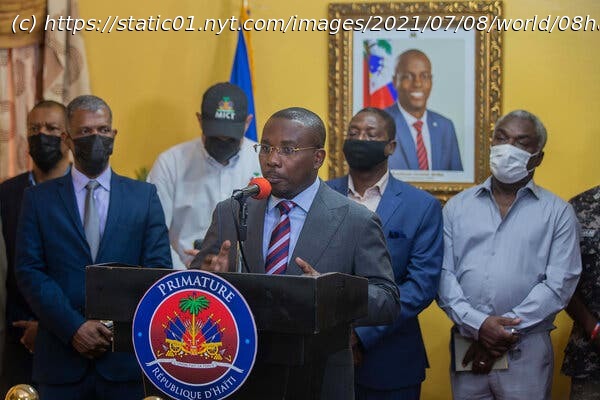Despite the interim prime minister’s claim that he is in charge after the president’s assassination, a volatile political situation poses yet another challenge to democracies in the Western Hemisphere.
The political storm in Haiti intensified on Thursday as two competing prime ministers claimed the right to run the country, setting up an extraordinary power struggle over who had the legal authority to govern after the brazen assassination of President Jovenel Moïse in his home the day before. Haiti’s interim prime minister, Claude Joseph, says he has taken command of the police and the army, declaring a “state of siege” that essentially put the country under martial law. But constitutional experts questioned his right to impose it, and his claim to power was quickly challenged by a rival. Two days before his death, Mr. Moïse had appointed a new prime minister, Ariel Henry, a neurosurgeon who was supposed to take up the role this week and told a local newspaper that he was the rightful prime minister instead. The dueling claims created a volatile political crisis that left constitutional experts confused and diplomats worried about a broad societal collapse that could ignite violence or prompt Haitians to flee the country en masse, as they have after natural disasters, coups or other periods of deep instability. “No one understands” what is happening right now, said Lilas Desquiron, a Haitian writer who was culture minister from 2001 to 2004, leaving the nation’s 11 million people in a “wait-and-see and powerless position.” Alarmed that Haiti may be approaching a breaking point reminiscent of the surge of Haitian refugees fleeing on boats to Florida after a 1991 coup, American officials quickly sided with the interim prime minister, Mr. Joseph, even though he was supposed to be replaced this week. Briefing reporters on Thursday, a State Department spokesman, Ned Price, said that Mr. Joseph was “the incumbent” at the time of the assassination and that the United States would continue to work with him “as such.” But he added that the United States had also “been in contact with” Mr. Henry, urging all Haitian officials to work together “to refrain from violence.” The top United Nations official in Haiti also backed Mr. Joseph’s claim as the rightful prime minister. The political struggle unfolded as Haitian security forces hunted for more of the attackers who killed the president. On Thursday, Haiti’s police chief, Leon Charles, said the authorities had arrested six suspected assailants, including at least one American citizen, and that three foreign nationals had been killed, adding to Haitian assertions that “foreigners” had been involved. Little was known about them, but officials identified the American as James Solages,35, a South Florida resident of Haitian descent. Haitian officials said another arrested suspect may also be a Haitian American but offered no other details. Angry civilians joined in the search for the assassins, capturing some suspects themselves, setting fire to vehicles thought to have been used in the attack and calling for vigilante justice. “Burn them,” one person cried in front of a police station. Haiti had already been reeling over the question of who should be running the country. For months, angry protesters had accused the president, Mr. Moïse, of overstaying his term in a drift toward autocracy. Now, with his assassination, the leadership question grew even murkier, especially since the nation’s democratic institutions have been severely hollowed out, leaving few legitimate arbiters in the country to oversee a legal transfer of power.






